Law named after my slain sister Kendra Webdale isn’t protecting New Yorkers enough: brother
by Heather Robinson

From The New York Post
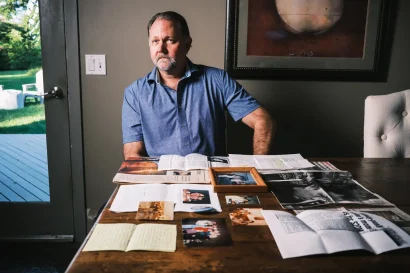
Ralph Webdale Jr. lost his older sister Kendra in 1999 when a mentally ill man pushed her in front of a subway. Ralph and his family fought for the passage of Kendra’s Law, which forces mentally ill people to be treated if they are a danger to themselves or others. Stephen Yang for NY Post
On January 15, 2022, Michelle Alyssa Go was waiting for an R Train at Times Square-42nd Street Station when she met a terrible end. The 40-year-old rising star at financial firm Deloitte was suddenly shoved in front of a subway by a mentally ill man — and killed instantly.
When Ralph Webdale Jr. heard about this innocent young woman’s death, it brought back a nightmare from his own life.
In 1999, he lost his 32-year-old sister, Kendra Webdale, when a mentally ill man, Andrew Goldstein, pushed her in front of a subway train and killed her — sending shockwaves through the city and fear into the hearts of straphangers, especially New York City women.
“My first thought was devastation for her and her family,” said Webdale of Go, whose alleged killer, Martial Simon, had been released from mental hospitals many times, just like Goldstein.
“My second feeling was one of being let down,” added Webdale, who was two years younger than Kendra and is now 54.

A writer and newspaper editor, Kendra Webdale was just 32 when she was killed by Andrew Goldstein. Kendra’s Law must be renewed every five years, and is currently set to expire in 2027.
After Kendra died, Webdale and his family crusaded for Kendra’s Law, which allows courts to order mentally ill individuals with a history of violence toward themselves or others to receive Assisted Outpatient Therapy (AOT), a mental health evaluation and a treatment plan, often including medication. If the mentally ill individual fails to follow the treatment plan, they may be held at a hospital or psychiatric facility for up to 72 hours and then released if they are assessed not to be an immediate threat to themselves or others.
Passed in 1999, Kendra’s Law also requires the state to prioritize the most severely mentally ill, moving them to the front of the line for treatment.
In April, New York’s state legislature renewed Kendra’s Law through 2027. (At present, the law must be voted on for renewal every five years). Some politicians, such as State Sen. George Borrello (R), a high school friend and schoolmate of Kendra’s, argue that the law should be made permanent and its provisions strengthened, including longer hold times for the mentally ill who fail to take court-ordered medication, and broader criteria for mandating Assisted Outpatient Therapy to include mentally ill people incapable of obtaining food, shelter and clothing.
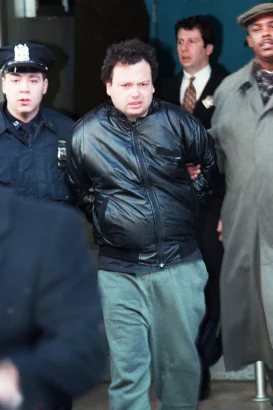
Goldstein was convicted of manslaughter and sentenced to 23 years in prison in October 2006. New York Post
Webdale said he “absolutely agree[s] that Kendra’s Law should be strengthened” — especially for the mentally ill with violent histories.
“I’d rather infringe — for a limited time — on the civil liberties of an individual who has repeatedly been violent than have them infringe on the civil liberties — and lives — of my sister, my mother, women who are afraid to take the subway. What about their civil liberties?” said Webdale, adding that he doesn’t think 72 hours is long enough for mental health professionals to hold and treat someone with a violent history.
The last time he was in New York City Webdale said he got the impression life there has deteriorated.

Like Webdale, Michelle Go was pushed onto an oncoming subway by a mentally ill man this past January. As with Goldstein, Go’s alleged killer had a long history of hospitalizations, yet had still been released to roam the streets. LinkedIn
“New York City was one of my favorite places, but I have no desire to go there now,” he said, “because you’re looking over your shoulder. And if you’re not, you’re naïve.”
Indeed, just last week, straphanger Elizabeth Gomes, 33, was attacked at the Howard Beach-JFK Airport station by a ranting homeless maniac who punched her in the face so hard she could lose sight in her right eye.
Webdale pointed to a recent kidnapping and rape of a female tourist riding the New York City subway and added, “I’m a pretty tough guy and so is my son, but when you go into New York City it doesn’t feel safe. My mother used to go to Serendipity for ice cream sundaes with Kendra and our other sister Kim, but I don’t think I’d want any of my family even visiting the city now.
“I hope that can change in the future, because we definitely enjoy a lot of the things the city has to offer.”
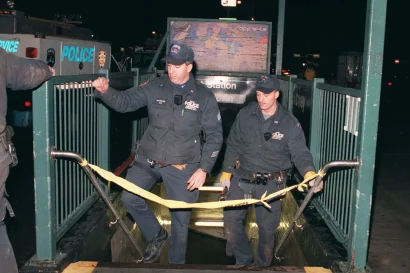
Police officers at the scene of Webdale’s murder nearly 25 years ago. Kind and trusting, Webdale’s brother called Kendra the “perfect victim” for a deranged attacker like Goldstein. New York Post
The Webdales were a family of six siblings; Ralph the only boy among his five sisters. They had a fun childhood filled with holiday celebrations and sports. Kendra loved New York. A writer, she had worked as a news editor for two weekly newspapers in Buffalo, and at the time of her murder, she was working as a receptionist for a record company, and writing a screenplay.
One day, Paul Simon came into the office, and Kendra called her brother to report the celebrity sighting (Simon & Garfunkel were a favorite band of theirs when they were kids, and Kendra’s headstone reads, “Sail On, Silver Girl.”)
Now a small business owner living in Redding, Conn., Webdale said he will never forget the day Kendra died.
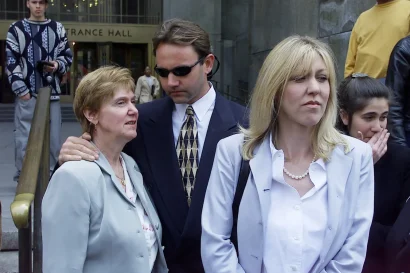
Ralph with his mother Patricia and sisters Kim and Krista outside court after Kendra’s killer, Andrew Goldstein, was sentenced to 23 years in prison. Goldstein was paroled in 2018. New York Post
“My sister Kim and I had to go and identify Kendra, which was an unbelievably emotional thing,” he said.
He said Kendra may have been the “perfect victim” because she was so trusting and kind.
“There was another woman 100 feet away, who looked like my sister, also blond,” he said. “She testified in court that Goldstein walked up to her and asked what time it was and she said, ‘Get away from me.’”
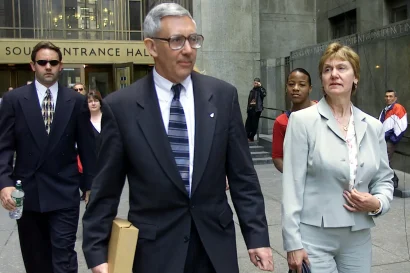
Kendra’s parents Ralph and Patricia Webdale outside the courthouse following Goldstein’s sentencing. Their son Ralph says the family had to endure his sister’s killer sitting just “20 feet away from” them during the trial. New York Post
“Goldstein went up to my sister then and she answered him kindly, at which point he knew when the train would be coming…” Webdale said, his voice suddenly catching, “…and proceeded to get in back of her and push her.”
Webdale said he raged at Goldstein for years.
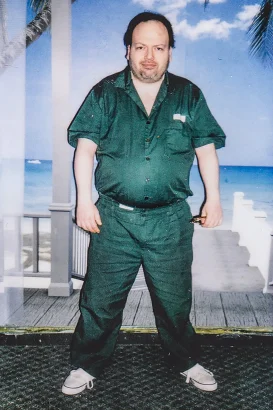
The New York State Department of Corrections said Goldstein is no longer under supervision of the prison system, and “we cannot speak to his location or custody status.”
“You want to be the protector of your sisters and your family. I struggled for many years trying to figure out whether I wanted to hurt Goldstein or help people like him.” He recalled that, during Goldstein’s trial, his family endured “him sitting 20 feet from me. I knew I … could’ve gotten to him.”
Ultimately, Webdale, along with the rest of his family, decided to do what they could to promote more effective treatment for the mentally ill.
Andrew Goldstein was convicted of manslaughter and sentenced to 23 years in prison in October 2006. He was paroled in July 2018, with five years psychiatric supervision upon release. A spokeswoman for the New York State Department of Corrections said he is no longer under supervision of the prison system, and “we cannot speak to his location or custody status” or comment on whether he is being medically supervised due to health privacy laws.
In March 2021, Borrello advocated strengthening Kendra’s Law including language drafted by former Gov. Andrew Cuomo expanding the criteria for extending AOT. Ultimately the bill did not advance due to opposition from legislative Democrats. Borrello said he plans to re-introduce the legislation at the start of the new session in January. He added, “When I argued for strengthening Kendra’s Law, the counterargument was, ‘We don’t want to encourage stigma against mental illness.’ As if there’s any shame in needing [mental health] treatment.”

Kendra (third from left) with her brother Ralph at their sister Suzanne’s wedding in 1995 along with their other siblings, Krista (far left), Kelly (second from right) and Kim (far right).
The American Civil Liberties Union of New York (NYCLU) objects to Kendra’s Law on the basis of civil liberties, arguing that it “unconstitutionally expands the circumstances under which the State may compel people with mental health challenges to undergo treatment against their will” according to its website. The NYCLU also states that “court orders” — the centerpiece of Kendra’s Law — “do not increase compliance or lead to any reduction in symptoms or problematic behavior.”
However, a 2009 Duke University study found that Kendra’s Law significantly reduced arrests and hospitalizations. And counter to criticism that Kendra’s Law disproportionately affects minorities, some argue that it actually increases equity by making AOT available to populations who are often disadvantaged in receiving mental health treatment.

Kendra worked as a news editor at a pair of weekly papers in Buffalo, NY. She eventually settled in New York, where she was working as a receptionist for a record company when she was killed. The North Buffalo Rocket
Nevertheless, there was an eight percent decline in people treated under Kendra’s law between 2017 and 2021.
“We have turned the city streets into mental hospitals and allowed people to suffer without treatment,” said Borrello. He cited Buffalo mass shooter Payton Gendron as “a man with clear signs of severe mental illness that went unchecked.”
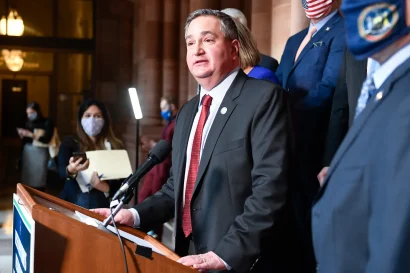
State Sen. George Borrello (R), who went to high school with Kendra, argues that the law named after her doesn’t go far enough. Not only should it be made permanent, it should include longer hold times for mental health patients who refuse court-ordered treatment. Hans Pennink
Borrello said that in his view, Kendra’s Law is not punitive toward the mentally ill, who don’t benefit by lack of treatment.
“They are trying to make it about social justice issues instead of public health,” he said. “Untreated mental illness condemns those suffering it to a cruel and miserable life.”
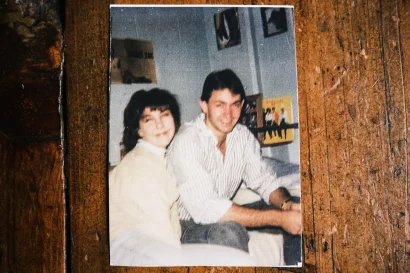
Kendra Webdale with her brother Ralph in a photo from 1987. He said Kendra was a compassionate woman who often gave food to a homeless man near her Manhattan apartment. Stephen Yang
Webdale said he also opposes “bail reform” for violent crimes, saying, “You’ll just keep cycling the same people through the legal system till they get out, hurt someone, hurt your family.” And he believes New York should invest in “railings” and other safety measures in the subways, and in a public safety campaign with billboards educating the public about how to obtain mental health treatment for themselves or others through Kendra’s Law.
In the meantime, he wants Kendra to be remembered as she was — gentle, loving and fun.
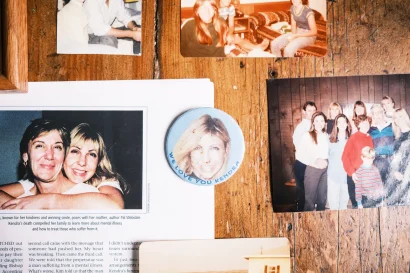
Kendra Webdale during happier times with her family and friends. Her brother Ralph believes New York state should better educate the public about Kendra’s Law to ensure those who need mental health services actually receive them. Stephen Yang
Growing up, he and Kendra spent long hours together “tying grapes” in chilly October in the wine country of Chautauqua County where they grew up.
“We earned three cents a vine,” recalled Webdale. “We spent hours making up stories, singing songs and telling stupid jokes. Kendra and I spent a lot of time together just being silly.”
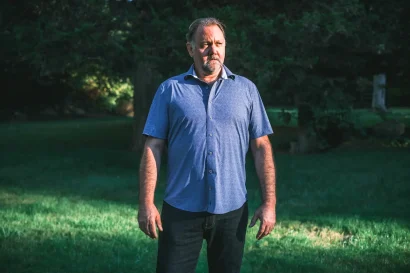
Ralph Webdale said “bail reform” for violent crimes only perpetuates the cycle of arrest-and-release for criminals like Goldstein and Simon Martial, who is charged with pushing Michelle Go to her death earlier this year. “They get out, hurt someone, hurt your family,” he said. Stephen Yang for NY Post
But most importantly, his sister was known for her compassion, he said.
After her death, his parents received a letter from a homeless man writing that he “occupied a space near where Kendra’s apartment was” on Manhattan’s East Side.
This entry was written by Heather Robinson and posted on October 2, 2022 at 4:30 pm and filed under Features. permalink. Follow any comments here with the RSS feed for this post. Keywords: . Post a comment or leave a trackback: Trackback URL. */?>



